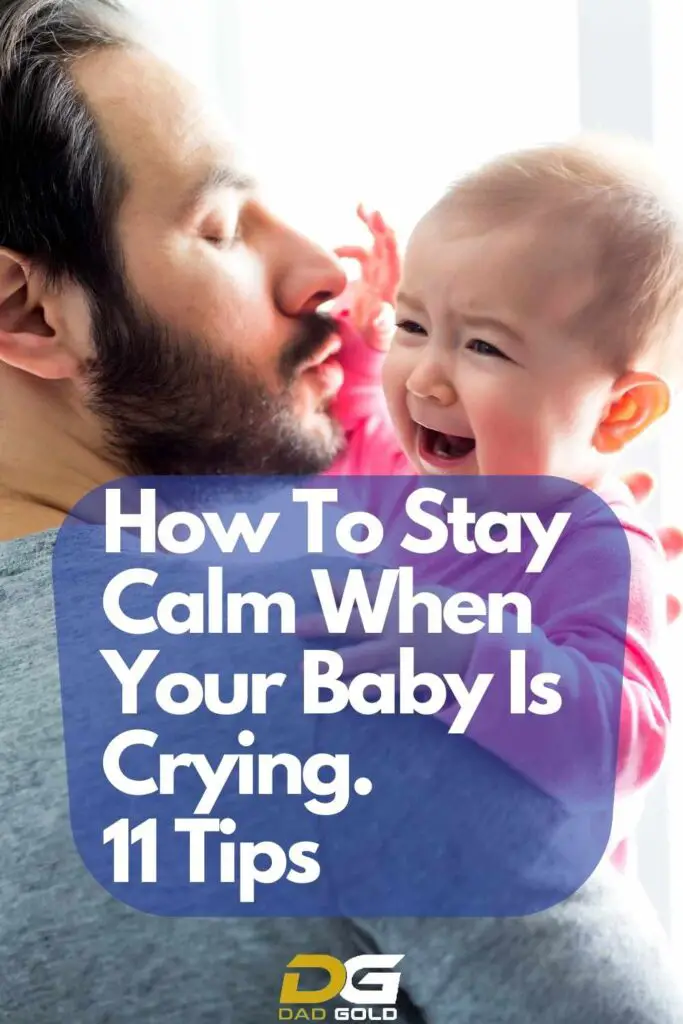All babies cry and get fussy sometimes.
Crying is their only way of communication, and their cries sound different based on their needs.
How else would they let you know when they’re hungry or uncomfortable?
It can be challenging for new parents to differentiate their hunger cries from others. But they learn to respond to baby cues pretty soon.
While babies cry for many reasons and usually calm down when you take care of their needs, sometimes they continue crying without any apparent reason.
Know that it’s completely normal for parents to feel anxious, frustrated, and overwhelmed when they can’t figure out how to help this little human being.
However, most of your baby crying has nothing to do with your parenting skills. Not being able to soothe your crying baby doesn’t make you a bad parent.
So, cut yourself some slack, and let’s see what you can do to stay calm to help your baby.
-

Bold Male Pride – Baseball Trucker Cap Celebrating Masculinity
£18.00 Select options This product has multiple variants. The options may be chosen on the product page -

Dad Bod Appreciation Gift Mug
£14.00 Add to cart -

Dad Bod, Bad Jokes Structured Baseball Cap
£22.00 Select options This product has multiple variants. The options may be chosen on the product page

Reasons Why Your Baby Won’t Stop Crying
Does it feel like your brain short-circuits every time your baby starts crying? Your baby’s crying is meant to be a little irritating, so it makes you respond to it and take care of their needs.
Let’s look at the common reasons why babies cry, shall we? Babies usually cry when they’re:
- Sleepy or tired
- Wet and needs a diaper change
- Hungry
- Overstimulated from too much noise or lots of activity
- Feeling too hot or cold
- Colicky
- In some sort of pain or not feeling well
- Feeling lonely and need to be held or rocked
- Experiencing stranger anxiety
While it’s normal for babies to cry for 2–3 hours a day for the first 6 weeks, some babies cry more in the first few months. When a healthy baby frequently cries for a prolonged period without any apparent reason, that baby might have colic and is called a colicky baby.
Also, your baby can pick up on your mood, tone of voice, and facial expressions as early as 3 months of age. So, when you get stressed or even angry, that intensifies your baby’s fussiness.
How to stay calm when your baby is crying: 11 Tips
If you’ve fed and burped your baby, changed the diaper, tried to comfort them in every possible way, but nothing seems to work, it can be frustrating.
So let’s see what you can do to stop feeling stressed and angry in a situation like that.
Step Away

This is probably the best thing you can do for yourself and your baby when you’re about to snap. Simply stepping away and taking a few minutes may be all you need to recompose yourself. It will give your nervous system some time to reset so that you can go back to soothe your baby.
So, the next time nothing seems to calm your fussy little one, hand them over to your partner and leave the room. If you’re alone, put your baby in a safe place and walk out of the room. Make sure no blankets or toys are lying around them, and lock the door behind you.
Remind yourself that walking away when you’re about to snap doesn’t make you a bad parent.
Take a Breather

Even if it’s just for a few minutes, taking a break can be a game-changer for you. So, whenever you start to feel overwhelmed because your little one won’t stop screaming, ask your partner, friend, or family to take over so that you can take a break.
Use that time to splash some cold water on your face, take a quick shower, call a friend, have a cup of tea, or do whatever helps you feel better. No matter how frustrated you are, never shake or hit your baby.
Sometimes parents lose control and shake their baby out of anger which may cause the shaken baby syndrome. Shaking a baby even for a few seconds can cause permanent brain damage, paralysis, or death.
Find Your Mantra

A mantra can be your motivating word, chant, or phrase that you can repeat to soothe anxiety and stay calm. When your crying baby makes you feel like tearing your hair out, a mantra can be a powerful tool to help you stay mindful and let the negative thoughts go.
You can choose your mantra, and it doesn’t have to make sense to anybody else. If there’s a word that reminds you of a good day and calms you down, that’s your mantra. Might some examples help? How about ‘This too shall pass, ‘Keep breathing,’ or ‘It’s just a phase and my baby will grow out of it?’
Create a Calming Playlist

Engaging in music therapy can be a great way to stay calm and tame your anxiety when you’re trying to soothe a fussy baby. Make a feel-good playlist and turn it up next time you start to feel stressed. Your baby may even like some tracks and stop crying whenever you play them.
Having a playlist handy can help you feel relaxed and soothe your fussy baby to sleep.
Try Mindful Breathing

It’s normal for you to feel stressed when your baby won’t stop crying. People tend to take small, shallow breaths when they’re stressed. Try to recognize the signs of stress and practice mindful breathing to calm down and relieve stress.
To put it simply, mindful breathing means focusing on the natural flow of breathing-the exhale and inhale. When you feel overwhelmed, close your eyes and make sure to take deep, even breaths through your nose and breath out through your mouth.
Take 5 minutes of your day and use it to focus on inhaling and exhaling instead of worrying about your crying baby.
Get Outside with Your Baby

Step outside if your crying baby starts to make you frustrated or angry. Take a stroll around the block to enjoy the sun and the outside air. It might soothe your child as well as calm you down. Don’t worry too much about how your neighbors or strangers will react to your crying baby.
You may also go out for a short drive with the baby. Buckle them into a car seat in the back of your car and drive around. You can check out the nearest drive-thru coffee shop or restaurant while you’re at it and reward yourself for not losing your cool.
Even if it’s not possible to go outside at the moment, try changing the scenery, even if it’s just from one room to another.
Use Your Support System

They say, “It takes a village to raise a child” for a reason. Don’t hesitate to ask for help from your partner, friends, and family whenever you need it. Also, happily accept help when anyone offers. Join a parent support group and make friends with other parents.
Support groups create a safe space for parents to share their experiences and express themselves without the fear of judgment. Talking to other parents about what you’re going through helps you remember that you aren’t alone.
Also, don’t hesitate to call your midwife, GP, or health care provider if you feel like you’re at the risk of shaking or harming your baby.
Make Time for Self-care

Not only can babies sense it when their parents or caregivers are stressed, but it also affects their mood. It impairs your ability to take care of the baby when running on fumes. So, take some time out of your hectic schedule, prioritize self-care, and find some ‘Me Time’ every day.
Only a few minutes of daily self-care can help you prevent parental burnout and help you reduce stress.
Remind Yourself that Your Baby Needs You

You might feel like your baby doesn’t feel connected to you or you’re doing something wrong when you struggle to help them soothe. But you need to be kind to yourself and remember that they’re just trying to communicate their needs.
Their fussiness has nothing to do with your feelings; it doesn’t reflect on their bonding with you, and they love you with all their little heart. So take one day at a time, reach out for support when you need it and be there for your little one.
Identify Your Triggers

Figure out when your baby’s crying bothers you the most. You might feel the worst when you’re hungry, burned out, sleep-deprived, or have been cooped up in the house for too long. Once you recognize your triggers, you can try to avoid hitting your breaking point.
Keep healthy snacks around to tackle feeling hangry, try to get some sleep when the baby sleeps, and go outside, even if it’s just for a few minutes. Whenever your crying baby starts to get on your nerves, do a self-check-in and manage your triggers before they cloud your mind.
Seek Professional Help

If you constantly feel overwhelmed and anxious, which affects your ability to care for your baby, you might benefit from professional help.
Working with a therapist and identifying the root causes of the problem can help you deal with any mental health issues that you might experience. It might also enhance your confidence as a parent.
Conclusion
While you shouldn’t ignore the baby cues and try to respond to your baby’s crying most of the time, sometimes it’s okay to let them cry it out while you gather your strength. Also, keep in mind that there will be times when you can’t comfort your baby no matter how much you try.
It can be stressful, but better days are coming, and your baby will soon grow out of it. So you just need to take care of yourself, stay calm, and hang in there.

